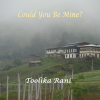
In that remote corner of the earth, celestial distinctions seemed to have faded away. Was it the earth or the sky she was walking on, she could hardly discern. Clouds somersaulted on the road, touching the ground with their wispy white fingers, catapulted into the air, only to land again. She tore into a thin transparent sheet of mist, which in turn encircled and wrapped her. Tiny cold drops settled on her skin. It was a typical morning in eastern Bhutan. An absolute quite surrounded the path. With a population of a meagre seven lakhs, the country was sparsely inhabited. No morning hustle-bustle, no cacophonic sound of vehicles. The rush that she despised so much was completely absent. At other times she would have absolutely loved it. A perfect cloudy weather which appealed immensely to her romantic instincts, and generally turned her thoughts into a beautiful poem. But today, she was quiet, not in celebration of this serenity, but in the angst of an inner turmoil. So, the playfulness of the clouds with the earth symbolized the changing nature of human relationships, sometimes close as in embrace, sometimes moving away in disgust. The cold drape of the mist only added to drops of tears assembled inside. The greyish surroundings only enhanced the gloominess of the heart.
With heavy steps, she accompanied her mother into the office of the Director. He headed the only college in eastern Bhutan, a renowned one under the patronage of the Royal University of Bhutan. Sherubtse College of Kanglung was highly sought after among the students who wished to pursue higher studies and didn’t go abroad for the same. Her mother, a Professor of History was here to interview the Director and the teachers for her Major Research Project on Educated Middle-Class Bhutanese Women. Thus, irrespective of the personal problems, the official work had to be done as scheduled. She had learnt to separate personal feelings from professional work and deployed the skill deftly. So, without betraying any emotions, she handled the voice recorder, clicked photographs, distributed questionnaires, collected statistics, and looked for any additional information which could be useful for the project.
By afternoon when the work was done, both women proceeded to the college canteen. Away from the official glance they could let their guard down, and thus sprung again the pall of gloom they had pushed beneath the professional veneer. Both ate in silence, staring into the distance, pondering over the news from home. Though the future is always uncertain, human beings get unsettled when their painstakingly created equilibrium is disturbed. In such times, the world seems to collapse around us. They were both feeling very…very alone, and helpless to some extent. The remoteness and seclusion of the place they were in seemed to accentuate the feeling.
Suddenly like an unexpected shower in a desert, a soft voice resounded somewhere nearby.
“Why are you so sad?” both of them looked around.
A young boy in traditional Bhutanese dress Gho, a checkered knee-length coat with long sleeves and long socks beneath, was standing near their table, looking down at the mother with utmost concern. The mother-daughter duo felt puzzled for a while. In the society where they came from, it wasn’t usual for strangers to walk up to someone and ask straightaway the reason for their sadness. As women, they had trained themselves to be cautious of any stranger approaching and initiating a conversation. They must be even more careful in a foreign land. But before they could react, the boy repeated the question, “Why are you so sad?” this time sitting down on his haunches near the table. “Nothing,” the mother said.
“You are in my country. It is my duty to make you happy” the boy persisted in his extremely soft voice laden with genuine concern and a driving desire to do something to alleviate the pain of ‘his guests’. The daughter who herself was in her early twenties felt intrigued. Where was he from? From which world? Is there really a place where people feel so concerned for strangers visiting their country? But there he was, a living embodiment of that, a wonder in himself. Whatever it was, he did act as a positive distraction from their internal misery. The tension was eased. She felt relieved to see her mother talking nicely to the boy, inquiring about his education. He happened to be a B.A. first-year student of Political Science, a subject her mother had a great interest in. Gradually they felt their nerves relaxing. She noticed that the sun was peeping out of the curtain of clouds; more students attired just like him in Gho were animatedly playing football on the college ground. The clock needle was no more stuck and was again moving. In the harsh world of realities, a tender word of genuine compassion had soothed the wound, if not healed it. Perhaps in another birth, Buddha’s name was Tenzin Gyaltsen and he gifted to his friends from India a song, “where the fields are green, to see you once again…my love!” The “Mother mom” as he addressed her, affectionately parceled him reference books of Political Science. “With love from India!”
Three years later, she sat at Tribhuvan International Airport of Nepal, waiting for her flight to Lukla. This flight hadn’t been able to be airborne for the last three days due to bad weather, and today also the uncertainty persisted. The primitive airport was filled with people of all nationalities, mostly westerners, aspiring to head deeper into the Himalaya for a trek or a climb. It was after all April, the season of pre-monsoon climb. There was scattered an assortment of big blue drums, peculiar of any mountaineering expedition, duffle bags, and branded rucksacks. The would-be passengers sat and layover these wherever they found a place. There was no announcement of any flight taking off but the weather was predicted to open up today, so everyone was expectant to depart from Kathmandu for further destinations. However, no one knew how long the wait would be, as it was already approaching the middle of the day. She herself had been sitting there since morning, scribbling in her diary to utilize time.
As she intermittently lifted her gaze to collect her thoughts, her eyes fell upon a middle-aged man. He was sitting at a distance of around twenty feet, adjacent to the metal screening door. The expression on his face betrayed his restlessness. Two deep furrows bedecked his forehead. Over an hour had passed and on each interval, she met the same worried expression. Suddenly, a ruckus broke out at the airport. People sprang to their feet. Hurried activities began taking place. She hurriedly put her diary back in her handbag while her Sherpa literally pushed her through the screening door. The flight had been announced and everybody was rushing to board it, as the departure of the next flight wasn’t sure. As she stepped past the man, she stole a moment to glance back and threw a sentence.
“Why do you look so worried?”
The man looked at her startled. But there wasn’t any time to listen to his answer. She was already pushed ahead, and into the plane. The tiny twenty-seater took her over the mountains to Lukla, a hamlet at 9000 feet from where many Himalayan treks and climbs began. Now her mind was focused only on the task in front, which seemed larger than life, and for her it literally was. After all, it was a call from the highest!
As evening dawned, she proceeded to the dining hall which was a huge wooden room. Alongside the walls, there lay wooden benches in front of which wooden tables were placed. In the centre a bukhari (a heating system) was burning. She stood at the entrance looking for a place to sit but the hall was packed. Suddenly, she heard someone calling her, “You may come here”. A man was standing and motioning her to a vacant place adjacent to him. She moved forward, thanked him, and seating herself there, started scanning the menu to order her meal.
“Do I look happy now?” her neighbour asked. It was her turn to get startled. She had quite forgotten the guy and expected in the least to encounter him again, that too in such a dramatic manner.
“Oh, It’s you! I am sorry I was preoccupied with my thoughts. Yes, you seem more relaxed now.”
The man told her that he was from Denmark and was worried about the well-being of his girlfriend who had returned home after seeing him off in Kathmandu. She listened empathetically. Further talks revealed that he was heading for the Gokyo Ri trek, the route to which was the same as hers for the next four days after which it bifurcated. She preferred to walk at her own pace and therefore trekked with her Sherpa. On the third day in the evening, they met the guy again as they happened to stay in the same lodge. She found his company pleasant as he was a dignified and non-interfering person. Interacting with people from different cultural backgrounds was one of her hobbies. She loved finding the underlying similarities among outwardly different customs and beliefs. He was reading a book titled ‘Aleph’ by Paulo Coelho, who happened to be one of her favourite authors. However, she hadn’t read Aleph and was excited to see this new book. Generally, at dinner time, she sat alone observing trekkers who were mostly in pairs, or a father-daughter duo, or a group of friends. She missed her last year’s team and was happy to have an intellectual company in him.
In due time, they parted ways to their respective destinations. At Everest Base Camp (EBC), she got busy preparing for the higher climb. After a few days, her phone beeped with a text message. The sender was the same guy from Denmark. He expressed his wish to come up to EBC to meet her before finally heading down. EBC was an additional two hours trek from his location.
“Why would someone take so much trouble at this altitude of more than 17000 feet?” she wondered but conceded. So, there he appeared, a little tired but grinning. Amidst the icy cold environs of the Everest, his gesture felt like a warm hug. Notes on each other’s well being exchanged, and a little time spent sitting on a rock admiring the snowy grandeur of the mountain, it was the hour to depart. Reaching back the safety of the shelter before the late afternoon was imperative in mountains. As he got up, she was surprised to see tears in his eyes. He held out the Aleph for her. Do the characters in novels come alive at times? She handed him the brownie chocolate cake, which she had brought for her base camp stay. As they turned and moved in opposite directions, she walked overwhelmed, wondering what she had done for the man to deserve the welling up of emotions while leaving.
Life moved on. The harshness of a human society caught up with her again. A wandering cloud, she struggled to adjust within the rules, norms, restrictions, conventions that are so intricately woven around each living being until they die. Her light was dimming. Close to being a living carcass, she must have appeared pale. What an irony that unlike animals most humans can’t smell death! So, continuing with the normal, she checked into one of the four-star hotels in South India. It was to be a study course for promotion, something she was good at. Books had always been her faithful companions. But when was life merely limited to books!
“Hey!” a voice greeted her enthusiastically.
She turned around from the reception desk, clutching her room keys.
“Hi” a feeble sound, accompanied by a forced smile came out of her throat. His expressions changed as if he had seen something unusual.
“What happened to you? What are you so sad?”
“Nothing”, and the story began….
About the Author






Comments